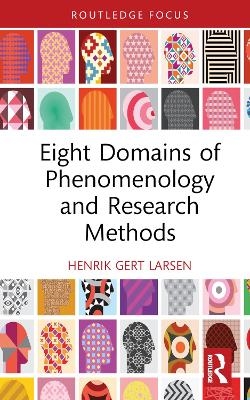
Eight Domains of Phenomenology and Research Methods
Seiten
2023
Routledge (Verlag)
978-1-032-21797-0 (ISBN)
Routledge (Verlag)
978-1-032-21797-0 (ISBN)
Eight Domains of Phenomenology and Research Methods is a unique text that explains how the foundational literature representing our lifeworld experience aligns theory with research methods.
Maintaining focus on the core problem of phenomenological investigations, the author strives to bridge theory with applied research by critically reviewing examples from the applied literature. With the extensive use of the foundational literature’s original voices, the book elaborates on how renowned scholars such as Husserl, Heidegger, and Sartre argued their ideas. A range of diverse voices is also explored through the perspectives of feminist and Black phenomenologists. The text then goes on to unpack the phenomenological methodologies with detailed explanations of signature techniques, hereunder the epoché and reduction from the perspectives of transcendental phenomenology, phenomenological psychology, and genetic (generative) phenomenology. Finally, it addresses the problem of articulating phenomenological research questions as well as interview questions that align with the different domains and methodologies.
This book is a must read for postgraduate students, dissertation students, and qualitative researchers interested in conducting phenomenological research within social psychology, sociology, and education.
Maintaining focus on the core problem of phenomenological investigations, the author strives to bridge theory with applied research by critically reviewing examples from the applied literature. With the extensive use of the foundational literature’s original voices, the book elaborates on how renowned scholars such as Husserl, Heidegger, and Sartre argued their ideas. A range of diverse voices is also explored through the perspectives of feminist and Black phenomenologists. The text then goes on to unpack the phenomenological methodologies with detailed explanations of signature techniques, hereunder the epoché and reduction from the perspectives of transcendental phenomenology, phenomenological psychology, and genetic (generative) phenomenology. Finally, it addresses the problem of articulating phenomenological research questions as well as interview questions that align with the different domains and methodologies.
This book is a must read for postgraduate students, dissertation students, and qualitative researchers interested in conducting phenomenological research within social psychology, sociology, and education.
1. Introduction
2. Review of the Seminal Methodological Literature
3. What Is a Phenomenon?
4. I Think Therefore I Am
5. Why Are We Studying First-Person Point of View Experiences?
6. Epistemological Phenomenology
7. Epoché and Reduction: The Phenomenological Methods
8. Existential Phenomenology
9. Critical Phenomenology
10. The Phenomenological Research Question
11. The Phenomenological Interview
12. Decision Tree
References
Index
| Erscheinungsdatum | 18.01.2023 |
|---|---|
| Zusatzinfo | 2 Line drawings, black and white; 2 Illustrations, black and white |
| Verlagsort | London |
| Sprache | englisch |
| Maße | 138 x 216 mm |
| Gewicht | 500 g |
| Themenwelt | Geisteswissenschaften ► Philosophie ► Philosophie der Neuzeit |
| ISBN-10 | 1-032-21797-9 / 1032217979 |
| ISBN-13 | 978-1-032-21797-0 / 9781032217970 |
| Zustand | Neuware |
| Informationen gemäß Produktsicherheitsverordnung (GPSR) | |
| Haben Sie eine Frage zum Produkt? |
Mehr entdecken
aus dem Bereich
aus dem Bereich


